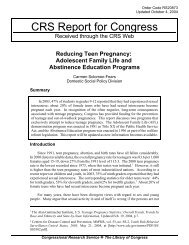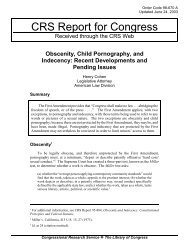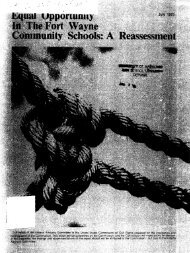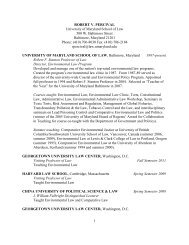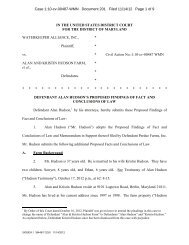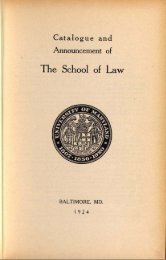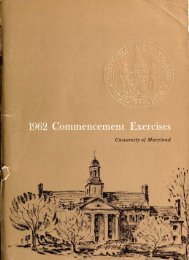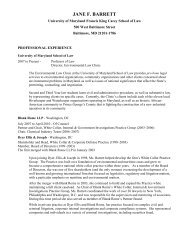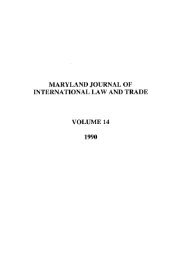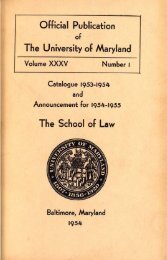University of Maryland School of Law : Catalog, 1988-1989
University of Maryland School of Law : Catalog, 1988-1989
University of Maryland School of Law : Catalog, 1988-1989
Create successful ePaper yourself
Turn your PDF publications into a flip-book with our unique Google optimized e-Paper software.
sciences. It is university-wide, interdisciplinary<br />
program with<br />
courses available on all campuses<br />
<strong>of</strong> the university.<br />
The Master <strong>of</strong> Arts in Liberal<br />
Education helps students to develop<br />
the skills <strong>of</strong> the liberal arts<br />
through the study and discussion <strong>of</strong><br />
works that are among the richest<br />
sources <strong>of</strong> our Western intellectual<br />
tradition. The degree is <strong>of</strong>fered<br />
through the Graduate Institute in<br />
Liberal Education at St. John's<br />
College in Annapolis.<br />
The Master <strong>of</strong> Policy Sciences<br />
program teaches students the concepts<br />
and skills for analyzing policy<br />
alternatives in both the public and<br />
private domains. This degree is <strong>of</strong>fered<br />
through the Policy Sciences<br />
Graduate Program at the <strong>University</strong><br />
<strong>of</strong> <strong>Maryland</strong> Baltimore County.<br />
The purpose <strong>of</strong> the Master <strong>of</strong><br />
Public Management program is to<br />
develop the critical analytical skills<br />
necessary to the formulation and<br />
management <strong>of</strong> public sector programs.<br />
It is <strong>of</strong>fered through the<br />
<strong>School</strong> <strong>of</strong> Public Affairs at the<br />
<strong>University</strong> <strong>of</strong> <strong>Maryland</strong> College<br />
Park.<br />
The Master <strong>of</strong> Social Work<br />
program exposes students to issues<br />
and methods <strong>of</strong> social work and to<br />
the relationships between social<br />
work programs and the legal system.<br />
It is <strong>of</strong>fered through the <strong>University</strong><br />
<strong>of</strong> <strong>Maryland</strong> <strong>School</strong> <strong>of</strong> Social<br />
Work and Community<br />
Planning at the Baltimore City<br />
campus.<br />
Candidates for dual degree programs<br />
must apply for admission to<br />
the law school as well as to one <strong>of</strong><br />
the graduate schools and must<br />
meet each school's admission criteria.<br />
Students already enrolled in<br />
the law school may enter the program<br />
no later than the completion<br />
<strong>of</strong> the second year in the <strong>School</strong> <strong>of</strong><br />
<strong>Law</strong>. However, interested students<br />
are urged to enter prior to the start<br />
<strong>of</strong> the second year.<br />
Under the dual program, 75<br />
credits in law school coupled with<br />
39 credits in business courses, 21<br />
credits in criminal justice courses,<br />
36 credits in liberal education<br />
courses, 30 credits in policy science<br />
courses, 39 credits in public<br />
affairs courses or 51 credits in social<br />
work courses are required for<br />
graduation.<br />
Grade averages in the <strong>School</strong><br />
<strong>of</strong> <strong>Law</strong> and the graduate programs<br />
are computed separately, and students<br />
are eligible for honors in<br />
each based on the existing criteria.<br />
Students must meet passing requirements<br />
in each school to continue<br />
in the program. However, a<br />
student failing in one school, but<br />
meeting passing requirements in<br />
the other, may complete work for<br />
the degree in the school in which<br />
he or she is able to maintain a<br />
passing average. Of course, such<br />
completion must be upon the same<br />
conditions (credit hours, residency,<br />
etc.) as required <strong>of</strong> regular (nondual<br />
program) degree candidates.<br />
Financial aid is handled independently<br />
by each school; therefore,<br />
financial aid applications<br />
should be submitted to both<br />
schools. Students' schedules must<br />
be approved by the law school advisor<br />
for the dual program, Dean<br />
Hornstein, and by the advisor designated<br />
by the other school.<br />
For purposes <strong>of</strong> the residency<br />
requirement, a student in a dual<br />
degree program may treat as credits<br />
earned at the law school up to<br />
nine credits earned at the other<br />
school. The credits are counted toward<br />
the residency requirement in<br />
the semester or summer in which<br />
they are earned at the other<br />
school. These residency credits<br />
must be earned after the student<br />
enters the law school. However, if<br />
the student obtains the other degree<br />
in a dual program before or at<br />
the same time as the Juris Doctor<br />
degree, the student may apply up<br />
to nine credits earned in the other<br />
program before entering the law<br />
school. Any nonlaw credits applied<br />
toward a student's Juris Doctor degree<br />
requirements must be approved<br />
in advance by Dean Hornstein.<br />
63



